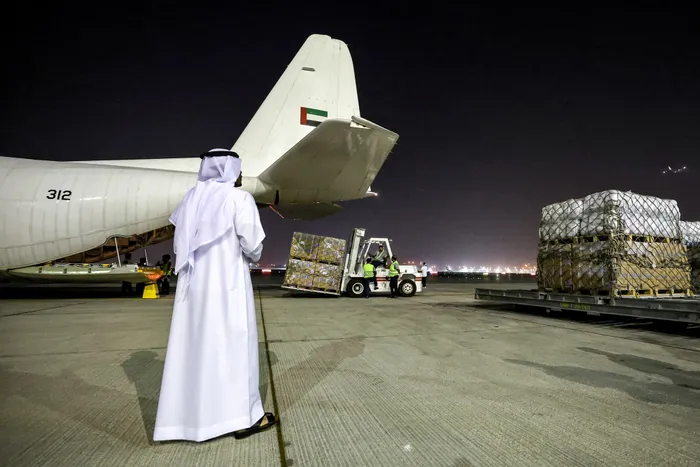WHO resolution calls for unimpeded flow of aid into Gaza

Picture: Giuseppe Cacace / AFP / Taken on October 19, 2023 – Humanitarian aid provided by the United Nations is loaded onto a United Arab Emirates Air Force aircraft at Dubai International Airport on October 19, 2023. On December 10, the World Health Organisation board adopted a resolution calling for immediate free-flowing humanitarian assistance for Palestine. During discussions around the resolution, US representatives opposed calls for a ceasefire. Israel’s brutal assault on Gaza has killed over 18,000 people, the writer says.
By Peoples Health Dispatch
Members of the World Health Organisation’s (WHO) executive board successfully adopted a resolution on the health conditions in the Occupied Palestinian territories during a rare special session of this body. Different opinions were voiced throughout the day of December 10 as the draft resolution was tabled at the meeting. However, the session resulted in adoption by consensus, something that other United Nations (UN) agencies did not manage to achieve.
The work behind the consensus was substantial, involving revisions of an original proposal brought forward by the representatives of Afghanistan, Morocco, Qatar, and Yemen. The final resolution calls for “the immediate, sustained, and unimpeded passage of humanitarian relief, including the access of medical personnel,” among other things. It also refers to the invocation of Article 99 of the UN Charter by the Secretary-General António Guterres last week.
The sordid conditions faced by health workers and patients in the Gaza Strip were among the main concerns addressed by the countries’ representatives. The WHO’s Health Emergency Program reported on the situation they continued to witness as they try to get enough medical supplies into Gaza and evacuate critical patients to nearby countries.
The agency’s experts also assessed that at least 1 in 5 people in Gaza will need specialised mental health support. Neither are these services currently in place, nor are they likely to be if financial support to the efforts in the field is not increased. As members of the emergency program took the floor on Sunday, collected donations amounted to less than a third of the WHO’s needs as per the UN Flash Appeal.
Both members of the WHO secretariat and delegates of the co-sponsors of the resolution described the strain that the few hospitals and health centers still functioning in Gaza are exposed to. The WHO warned that only 3 hospitals south of the Wadi Gaza line still had operational surgical capacities.
The strongest statements came from countries which have endured armed conflict, particularly those where the US had fought some of its most recent wars. Speaking on behalf of Afghanistan, former Minister of Public Health Wahid Majrooh said that, as a health worker who was “born in conflict, raised in conflict, and worked in conflict,” he understands very well what it means to live among rockets and explosions.
“As a doctor in Afghanistan, I can tell you what it means for someone to have tens of people injured around them, with no facilities to serve and help,” Majrooh said. Drawing upon personal experience and observations about repeated attacks on healthcare in all recent armed conflicts, from Afghanistan to Syria to Palestine, he called on WHO bodies to delve more deeply into the issue and thus help hospitals become “places of healing” once again.
Interventions from Latin American delegations, particularly Brazil and Barbados, echoed those coming from West Asia and North Africa, encouraging Executive Board members to cast aside differences in order to reach a “peaceful” solution that “puts people at the centre.”
A completely different argumentation was heard from delegates from high-income countries. Despite agreeing not to block the resolution, they mostly used their interventions to point out their support for Israel’s “right to self-defence.” Very few cracks appeared in the uniform surface of Global North countries’ statements, although there were shy attempts to step away. Among these, Slovenia repeated the European line condemning Hamas’ actions, but then said they “cannot ignore the suffering of the people in Gaza. The killing of civilians, including an extremely high number of children … is as well a heinous act, a clear violation of international humanitarian law and international human rights law.”
Rather unsurprisingly, together with the Israeli representatives, the United States spoke in terms most contrary to the humanitarian values repeatedly invoked in the room. Among other things, US delegates felt it was necessary to point out that there “is no specific international law that requires replenishment of medicines” in situations like the one faced now in the Gaza Strip, and objecting to interventions referring to Israel’s attacks as genocidal. The US delegation also made it clear they consider a ceasefire would be “not only unrealistic but also dangerous.”
The unwillingness of the US and its allies to back such an “unrealistic and dangerous” option has meant the death of more than 18,000 people in the Gaza Strip and close to 50,000 injuries, according to numbers published in a statement by the Palestinian Medical Relief Society (PMRS) – Gaza on December 11.
“The bed occupancy rate in hospitals has reached more than 274 percent, and the occupancy rate of intensive care beds has reached 227 percent,” the organisation said. More than half of Gaza’s population has been displaced and is now living in overcrowded shelters, without access to food or clean water. The situation is a public health disaster waiting to happen, the PMRS warned.
The only realistic solution to stop it, according to Palestinian health organisations? “Ceasefire now,” says the PMRS.
People’s Health Dispatch is a fortnightly bulletin published by the People’s Health Movement and Peoples Dispatch.
Related Topics: